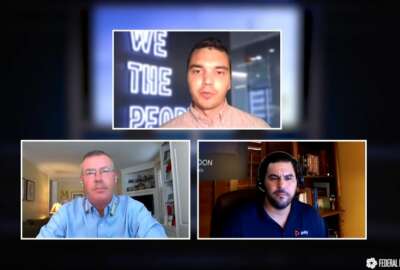
Younger feds maybe starting to question telework’s merits
As the pandemic and teleworking drag on, people stuck at home are starting to discover the secondary effect of isolation from coworkers.
Best listening experience is on Chrome, Firefox or Safari. Subscribe to Federal Drive’s daily audio interviews on Apple Podcasts or PodcastOne.
As the pandemic and teleworking drag on, people stuck at home are starting to discover the secondary effect of isolation from coworkers: There’s no one to commiserate with, no happy chance encounters, no exposure to bosses for potential promotion. Here to ruminate on the dark side of perpetual telework, long-time leadership scholar Bob Tobias joined Federal Drive with Tom Temin.
Interview transcript:
Tom Temin: Bob, I guess it’s different from you and I. I know you’ve been isolated in a remote cabin in a remote part of an Eastern State for some time now. But we’ve had our working careers mostly behind us. But for the young people, I think they’re beginning to question whether working from the couch is such a great idea.
Bob Tobias: Well, yes. We’ve been focusing when we’ve been looking at telework and efficiency. Can people who are teleworking actually do the work as efficient or even more efficient than coming into work? And I think that the answer to that question is yes, particularly in the federal government, the answer is yes. But now we’re starting to think about well here I am, all by myself, with only my Zoom to kick me company. And that’s not a substitute for a workplace where I bumped into people, and can enhance my networks at work, either in terms of promotions, or more importantly, as a social network, where I create friends and I do things together with those at work. I just don’t have those opportunities now that I’m at home all alone by myself.
Tom Temin: Yes. And I think also, some of the social networks that you create become professional networks over time. And I think you have to have been working a few years to understand how important that can be. Sometimes, without even realizing it, a name will pop up and golly, that fits something I need right now. So the opportunity to build that, what they used to call the black book of contacts, just doesn’t happen in this setting.
Bob Tobias: In the program that I participated in American University we focus on creating networks across where you work, because you need other people in other divisions, other agencies, to help you get your work done. But you really don’t have the opportunity to do that because there are no meetings where you might meet someone new from outside of those you already know. So the opportunities are constricting rather than expanding.
Tom Temin: And I think a lot of observers have begun to notice that the Zoom, and all of its clones and cousin types of applications, have limits to their utility in terms of some of the social aspects of it, in part, because one is looking at oneself, which is something you’re not used to doing in a meeting, you see everybody else but you don’t see yourself. I think we haven’t explored how profound a difference that really is in some setting.
Bob Tobias: I agree with you Tom. I have students who started in person, and then with the pandemic, it’s now online. And so every single group that has had both say, well you know the content is fine, we’re still getting the content. But what we miss is those opportunities to have lunch together, those opportunities to have a drink after class, those opportunities during breaks to explore something that was discussed, and to get a different perspective. So they don’t have that and Zoom doesn’t provide that. The spontaneity that comes from in person conversations.
Tom Temin: Also, there’s more awkwardness in Zoom. Like if you are in an hour long meeting at work, and you have to go hit the head. Well, you get up from your chair, you slip out, you slip back in no big deal. When you leave a Zoom meeting, either you have to turn off your camera, or you see somebody walk away, and what are they going and then you see this big empty space or worse, they take their device with them and you’re saying to yourself, please Dear God, don’t go to the bathroom with it, don’t go to the bathroom with it. So there’s a kind of awkwardness.
Bob Tobias: There is Tom. Don’t go to the bathroom with it. Let’s get focused here. So this idea of leaders who are employing teleworkers who will have this extended aloneness, I think have to start thinking anew about assisting in the creation of social networks and professional networks for the stay at home people.
Tom Temin: And I want to talk about the promotion aspects or at least the exposure to bosses aspects. Because sometimes in a real corporate setting, like a large federal agency, or any federal agency or any contractor company, one has exposure to one’s own boss. But I remember working in a large company that had a huge installation up near Boston, and my boss’s boss was there, and his boss and his boss, and they were all male in those days. So you’ve had exposure to people that could frankly do you good, and in my case, they didn’t do me good as time went on. That doesn’t happen with teleworking.
Bob Tobias: It does not. There doesn’t seem to be really conscious effort to make up for being quarantined. So even though there are meetings where people are on the back bench, Zoom meetings on the back bench, it’s not like being there where after the meeting you can walk up and introduce yourself and say, I’m Tom and I participated in the preparation of this material. It doesn’t happen, can’t happen.
Tom Temin: Yeah. So what do we do about this at this point?
Bob Tobias: Well, I think that the first thing is awareness, awareness that this is a problem. It is something that certainly my students are talking about, and their mid level managers in the federal government and higher members of the SES, they’re talking about it and thinking about it. But it’s a new awareness. So the first step is, I’m aware that the problem exists. And second, what am I going to do about it? And I think that, once I’m aware of it, I might be creative about maybe happy hours, maybe plan book club discussions. I’m not sure what the answer is. But I do know, it’s an issue that needs to be addressed.
Tom Temin: And I wonder if this is particularly worse for women, and perhaps minorities, people of color, that the people that we’re talking about trying to get more into the mainstream of participation in all levels of organizations from the bottom to the very top. I mean, often, exposure to people that are different is the best way to overcome whatever suspicions or biases you might have had. Because once you get to know everyone, they’re just somebody a person.
Bob Tobias: I agree. And I think that’s particularly an issue for my boss’s boss, because I don’t have that contact, I don’t bump into them in the hallway, I don’t see them in a cafeteria. So I have no way of letting myself be known, letting myself be seen by anyone other. For the most part they’re my boss and my immediate colleagues. It’s a very limiting atmosphere.
Tom Temin: And I’ve noticed one other kind of odd phenomenon on especially large Zoom meetings, I was participating in one just the other day, which was with my alma mater, and I’m on the advisory board of school newspaper, after 40 years, 45 years gone. I’m the outside advisor and the rest was professors and associate deans and so on about 12 people. And this poor kid who’s the editor who’s about to graduate. And nobody was smiling on that Zoom meeting, maybe because they didn’t like their looks in those crummy webcams. But I wanted to say, folks, this kid’s about to graduate. Let’s smile at them a little bit. Lighten up, lighten up a little bit.
Bob Tobias: Lighten up. I think that’s right. It’s really, really hard to stay focused on a Zoom meeting that lasts more than an hour. And a lot of these people are still back to back to back to back Zoom meetings. And it takes extra intellectual energy to stay focused, extra emotional energy to stay focused. And I think people are just tired.
Tom Temin: And for Lord’s sake, don’t try to eat lunch on Zoom.
Bob Tobias: The crunching of the potato chips does you in every time.
Tom Temin: That’s right. Mute yourself before that one. Bob Tobias is a professor in the Key Executive Leadership Program at American University. As always, thanks so much.
Bob Tobias: Thank you Tom.
Copyright © 2024 Federal News Network. All rights reserved. This website is not intended for users located within the European Economic Area.
Tom Temin is host of the Federal Drive and has been providing insight on federal technology and management issues for more than 30 years.
Follow @tteminWFED





